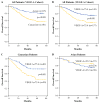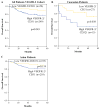Serum VEGF-A and Tumor Vessel VEGFR-2 Levels Predict Survival in Caucasian but Not Asian Patients Undergoing Resection for Gastric Adenocarcinoma
- PMID: 26259755
- PMCID: PMC4872865
- DOI: 10.1245/s10434-015-4790-y
Serum VEGF-A and Tumor Vessel VEGFR-2 Levels Predict Survival in Caucasian but Not Asian Patients Undergoing Resection for Gastric Adenocarcinoma
Abstract
Background: Clinical trials of agents targeting the vascular endothelial growth factor A (VEGF-A) pathway in gastric adenocarcinoma (GA) suggest that these therapies may have varying efficacy in different races.
Methods: VEGF-A in serum and/or VEGF receptor 2 (VEGFR-2) in CD31-positive tumor vessels (VEGFR-2/CD31) were measured in 118 Caucasians and 263 Asians who underwent gastric resection at two institutions and correlated with overall survival (OS). Blood was drawn before any treatment. Patients receiving neoadjuvant treatment were excluded from VEGFR-2 analysis.
Results: Compared with Asians, Caucasians were older (mean age 66-73 vs 59-62 years), had more proximal tumors, and had more advanced TNM stage. In the VEGF-A cohort, Caucasians had a median VEGF-A level that was 95 % higher than that of Asians and a much higher standard deviation (88 ± 6.206 vs 45 ± 76 pg/ml, p < 0.001). The 5-year OS for patients with low versus high VEGF-A levels was 72 versus 43 % in Caucasians (p = 0.001) and 86 versus 77 % in Asians (p = 0.236). In the VEGFR-2 cohort, OS was worse in Caucasians with high VEGFR-2/CD31 levels (49 vs 73 %, p = 0.038), while there was no significant difference in OS in Asians (80 vs 90 %, p = 0.119). On multivariate analyses of significant prognostic factors (excluding treatment factors and margin status), serum VEGF-A and tumor VEGFR-2/CD31 levels were independent predictors of OS only in Caucasians.
Conclusions: In patients with resectable GA, VEGF-A and VEGFR-2/CD31 levels are independent predictors of OS in Caucasians but not in Asians, suggesting varying importance of this pathway in GA progression among different races.
Figures



Similar articles
-
Prognostic significance of targetable angiogenic and growth factors in patients undergoing resection for gastric and gastroesophageal junction cancers.Ann Surg Oncol. 2014 Apr;21(4):1130-7. doi: 10.1245/s10434-013-3429-0. Epub 2013 Dec 27. Ann Surg Oncol. 2014. PMID: 24370903
-
Measurement of circulating levels of VEGF-A, -C, and -D and their receptors, VEGFR-1 and -2 in gastric adenocarcinoma.World J Gastroenterol. 2008 Jun 28;14(24):3879-83. doi: 10.3748/wjg.14.3879. World J Gastroenterol. 2008. PMID: 18609713 Free PMC article.
-
Serum vascular endothelial growth factor A and vascular endothelial growth factor receptor 2 as prognostic biomarkers for uterine cervical cancer.Int J Clin Oncol. 2019 Dec;24(12):1612-1619. doi: 10.1007/s10147-019-01495-x. Epub 2019 Jun 24. Int J Clin Oncol. 2019. PMID: 31236742
-
Prognostic and predictive value of vascular endothelial growth factor and its soluble receptors, VEGFR-1 and VEGFR-2 levels in the sera of small cell lung cancer patients.Med Oncol. 2008;25(4):394-9. doi: 10.1007/s12032-008-9052-4. Epub 2008 Mar 4. Med Oncol. 2008. PMID: 18317954
-
Prognostic value of vascular endothelial growth factor expression in resected gastric cancer.Asian Pac J Cancer Prev. 2012;13(7):3089-97. doi: 10.7314/apjcp.2012.13.7.3089. Asian Pac J Cancer Prev. 2012. PMID: 22994715 Review.
Cited by
-
Hepatic blood flow by perfusion computed tomography as an imaging biomarker for patients with gastric cancer.Oncol Lett. 2019 Mar;17(3):3267-3276. doi: 10.3892/ol.2019.9969. Epub 2019 Jan 25. Oncol Lett. 2019. PMID: 30867759 Free PMC article.
-
The Probe Based Confocal Laser Endomicroscopy (pCLE) in Locally Advanced Gastric Cancer: A Powerful Technique for Real-Time Analysis of Vasculature.Front Oncol. 2019 Jun 13;9:513. doi: 10.3389/fonc.2019.00513. eCollection 2019. Front Oncol. 2019. PMID: 31263680 Free PMC article.
-
Sunitinib added to FOLFIRI versus FOLFIRI in patients with chemorefractory advanced adenocarcinoma of the stomach or lower esophagus: a randomized, placebo-controlled phase II AIO trial with serum biomarker program.BMC Cancer. 2016 Aug 31;16(1):699. doi: 10.1186/s12885-016-2736-9. BMC Cancer. 2016. PMID: 27582078 Free PMC article. Clinical Trial.
-
Open and minimally invasive gastrectomy in Eastern and Western patient populations: A review of the literature and reasons for differences in outcomes.J Surg Oncol. 2022 Aug;126(2):279-291. doi: 10.1002/jso.26887. Epub 2022 Apr 13. J Surg Oncol. 2022. PMID: 35416303 Free PMC article. Review.
-
Clinical significance of various growth factors in patients with different gastric neoplasms.Am J Transl Res. 2020 Jan 15;12(1):118-129. eCollection 2020. Am J Transl Res. 2020. PMID: 32051741 Free PMC article.
References
-
- Jemal A, Bray F, Center MM, Ferlay J, Ward E, Forman D. Global cancer statistics. CA Cancer J Clin. 2011;61:69–90. - PubMed
-
- Cunningham D, Allum WH, Stenning SP, et al. Perioperative chemotherapy versus surgery alone for resectable gastroesophageal cancer. N Engl J Med. 2006;355:11–20. - PubMed
-
- Macdonald JS, Smalley SR, Benedetti J, et al. Chemoradiotherapy after surgery compared with surgery alone for adenocarcinoma of the stomach or gastroesophageal junction. N Engl J Med. 2001;345:725–30. - PubMed
-
- Bang YJ, Kim YW, Yang HK, et al. Adjuvant capecitabine and oxaliplatin for gastric cancer after D2 gastrectomy (CLASSIC): a phase 3 open-label, randomised controlled trial. Lancet. 2012;379:315–21. - PubMed
-
- Sakuramoto S, Sasako M, Yamaguchi T, et al. Adjuvant chemotherapy for gastric cancer with S-1, an oral fluoropyrimidine. N Engl J Med. 2007;357:1810–20. - PubMed
Publication types
MeSH terms
Substances
Grants and funding
LinkOut - more resources
Full Text Sources
Other Literature Sources
Medical

